北京地区成人本科学士学位英语统一考试
2015.05
Part I Reading Comprehension (30%)
Directions: There are three passages in this part. Each passage is followed by
some questions or unfinished statements. For each of them there are four choices
marked A, B, C and D, You should decide on the best choice and blacken the
corresponding letter on the Answer Sheet.
Passage 1
Questions 1 to 5 are based on the following passage:
Babies who are breast-fed may be more likely to be successful in life, a new
study published Tuesday suggests. The study followed more than 3,000 babies into
adulthood in Brazil. The researchers found those who were breast-fed scored slightly
higher in intelligence tests in their 30s, stayed in school longer and earned more
money than those who were given formula(配方奶粉).
“Breast-feeding not only has short-term benefits, but also breast-feeding has
long-term benefits, "says Bernardo Lessa Horta of the Federal University of Pelotas
in Brazil, who led the study being published in The Lancet Global Health.
(76) Doctors have long known that breast-feeding can be good for a baby’s health.
This is especially true in poor countries, where water can be contaminated. For
instance, a baby given formula in developing countries is 14 times more likely to
die in the first six months than one who’s breast-fed. In the U.S., some research
has suggested that breast-feeding may raise a baby’s IQ(智商)by a few points.
But a recent study with siblings(兄弟姐妹)found little advantage to breast-feeding.
Horta says these previous studies didn’t follow children into adulthood to see
if breast-feeding had long-term effects. So Horta analyzed data collected from 3,493
volunteers he and his colleagues have been following since birth. They are now in
their 30s. First, the researchers gave the subjects IQ tests. Those who were
breast-fed for 12 months or more had IQ test scores that were 3.76 points higher
than those who were breast-fed for less than one month, the team found.
When Horta and his colleagues looked at how much education the subjects had
gotten and how much money they were making, they also found a clear difference: Those
who were breast-fed the longest stayed in school for about an extra year and had
monthly salaries that were about a third higher.
�
1. From the passage, we learn that Horta_______________ .
A. is from Brazil
B. conducts his research in the U.S.
C. has 30 researchers on his team
D. is well-known in developing countries
2. Which of the following about those who were breast-fed is NOT mentioned?
A. They stayed longer in school B. They were happier
C. They were smarter D. They made more money
3. Which of the following is TRUE?
A. Doctors don’t understand the benefits of breast-feeding.
B. Horta is concerned with water contamination in poor countries.
C. Horta’s research project lasted about 30 years
D. Breast-feeding is the only way to improve a baby’s health
4. The word contaminated in Paragraph 3 is closest in meaning to____.
A. finished B. interested C. cleared D. polluted
5. Which of the following is an appropriate title for this passage?
A. Researchers Have Pointed Out the Disadvantages of Breast-feeding
B. Researchers Have Found Out the Shortcomings of Formula
C. Breast-feeding Improves Chances of Success
D. Breast-feeding Benefits Both Mother and Baby
Passage 2
Questions 6 to 10 are based on the following passage:
Maggie Walker was born in 1867 in Richmond, Virginia. Her mother was once a slave
in a rich woman’s house. When Maggie was very young, a thief killed her father.
Her family was impoverished, so Maggie's mother started doing laundry in her home.
�
Maggie had to help her. She washed clothes every day, but she continued to go to
school. She was a very good student, especially in math.
After Maggie graduated from high school, she got a job as a teacher. In 1886,
she married Armistead Walker. They had two sons and Maggie stayed home to care for
them. She also volunteered to help a social organization called the Order of St.
Luke. This organization helped African Americans take care of the sick and bury the
dead. Maggie Walker loved the work of the organization. The organization believed
that African Americans should take care of each other.
Over the years, Maggie Walker had more and more responsibilities with the
organization. In 1895, she suggested that St. Luke begin a program for young people.
(77) This program became very popular with schoolchildren. In 1899, Walk became Grand
Secretary Treasurer of the St. Luke organization. However, because she was a woman,
she received less than half the salary of the man who had the job before her.
The Order of St. Luke had a lot of financial difficulties when Walker took over.
It had a lot of unpaid bills and only $31.61 in the bank. But soon Maggie Walker
changed all of that. (78) Her idea was to get new members to join the Organization.
In just a few years, it grew from 3,400 members to 50,000 members. The organization
bought a $100,000 office building and increased its staff to 55. Now Walker was ready
for her next big step.
6. Maggie’s father died____________.
A. when she finished high school
B. before she was born
C. when she was very young
D. after she got married
7. Which of the following is NOT TRUE?
A. Maggie had two children.
B. Maggie was once a slave.
C. Maggie was good at math.
D. Maggie taught for a while.
8. Which of the following is TRUE?
A. Maggie loved to help other African Americans.
�
B. Maggie was very popular with school teachers.
C. Maggie was the founder of the Order of St. Luke.
D. Maggie was better paid than men as Grand Secretary Treasurer.
9. The word impoverished in Paragraph 1 is closest in meaning to _______.
A. difficult B. rich C. famous D. poor
10. After Paragraph 4, the author will probably talk about Maggie’
s__________________
A. education B. next project C. pay D. childhood
Passage 3
Questions 11 to 15 are based on the following passage:
When Bill de Blasio ran for New York City mayor last year, he promised to end
a controversial (有争议的), citywide cell-phone ban(禁令)in public schools, which
is not equally enforced in all schools. Now, under his leadership, the city is
preparing to end the ban. It will be replaced by a policy that allows phones inside
schools but tells students to keep them packed away during class.
Many schools have a rule about enforcing the ban that says, “If we don't see
it, we don’t know about it.” That means teachers are OK with students bringing
in cell phones, as long as they stay out of sight and inside bags and pockets.
But at the 88 city schools with metal detectors, die ban has been strictly
enforced. The detectors were installed to keep weapon out of schools,but the scanners
(扫描器)can also detect cell phones. So students at these schools must leave their
phones at home or pay someone to store it for them.
The ban was put into place in 2007 under mayor Michael Bloomberg. Ending the
ban will also likely end an industry that has sprung up near dozens of the schools
that enforce the ban. Workers in vans(厢式货车)that resemble food tracks store
teens’ cell phones and Other devices for a dollar a day,
(79) Critics of the ban say cell phones are important safety devices for kids
during an emergency. They also say that enforcement of the ban is uneven and
discriminatory. Where the ban is enforced, it puts a disadvantage on students who
can’t afford to pay to store their phones.
�
Before putting an official end to the cell-phone ban, city education officials
are working on creating a new policy. (80) It will include rules about not using
the phones during class or to cheat on tests.
11. Which of the following is the main idea of the passage?
A. New York City will give financial aid to poor students.
B. New York City plans to restrict cell phone use in libraries.
C. New York City plans to install metal detectors in all public schools.
D. New York City will soon end a ban on cell phones in schools.
12. Students pay ______ a day to leave their cell phones in a van parked near
their school.
A. a dollars B. two dollars C. five dollars D. ten dollars
13. Metal detectors were installed in 88 city schools, mainly to keep _______
out of schools.
A. cell phones B. weapons C. alcohol D. drugs
14. The word discriminatory in Paragraph 5 probably means________.
A. necessary B. tough C. strict D. unfair
15. According to the passage, which of the following statements is TRUE?
A. After the cell-phone ban is ended, students can use their phones during class.
B. The cell-phone ban is equally enforced in all public schools.
C. The cell-phone ban was put into place in 2008 under Mayor Bill de Blasio.
D. A phone-storage industry has appeared outside the 88 metal-detector campuses.
Part II Vocabulary and Structure (30%)
Directions: In this part there are 30 incomplete sentences. For each sentence
there are four choices marked A, B, C and D. Choose the ONE answer that best completes
the sentence. Then blacken the Corresponding letter on the Answer Sheet.
16. A: Excuse me, sir. But can you tell me if there is hotel near here?
�
B: Eh…there is one at the street comer, two blocks away.
A: Thank you very much!
B: _________!
A. Nice to see you! B. Pardon me.
C. You’re welcome. D. I agree.
17. It often takes some time for a new couple to________ to each other’s was
way of life.
A. refer B. listen C. amount D. adjust
18. Milk turns______ easily in the summer, so it is often kept in a refrigerator.
A. sour B. sweet C. bitter D. delicious
19. The Prime Minister had to________________ because he was believed to have
done something bad against his people.
A. release B. resign C. reform D. regard
20. Last Sunday when Mr Wang was leaving Beijing for Canada, a number of his
friend ______ at the airport.
A. found him out B. put him up
C. knocked him down D. saw him off
21. Bob doesn't work hard________ in school. He is playing all the time!
A. at all B. in all C. after all D. above all
22.1 want to buy a new tie to go______________ this brown suit.
A. into B. with C. after D. by
23. Amy is very afraid of dogs, ______________ ?
A. is she B. dose she C. isn’t she D. doesn't she
24. The engine gives___________ smoke and steam.
A. up B. in C. away D. off
�
25. Please turn the radio____________ . The baby is sleeping.
A. up B. over C. off D. around
26. Frank moved to California last summer and__________________ there since
then.
A. has stayed B. stayed C. is staying D. stays
27. The airplane___________ to have sunk to the bottom of Indian Ocean.
A. suppose B. supposes C. has supposed D. is supposed
28. The management have spent the whole day discussing the schedule of the
meeting _______ next year.
A. hold B. held C. to hold D. to be held
29. His car got stuck in the mud, so he_____ get off and asked the villager nearby
to help.
A. can B. had to C. used to D. may
30. It was__________ winter night and a pale moon hung low in_____ sky.
A. a; a B. the; the C. a; the D. the; a
31. When Jack came in, I________ dinner with my parents.
A. was having B. had C. am having D. have
32. Would you mind____ quiet for a little while? I am doing my course work.
A. keep B. to keep C. kept D. keeping
33. If you had come five minutes earlier, you________ him. It’s a pity you were
late!
A. would meet B. would have met
C. met D. had met
34. My friend Peter,_____ had been on a visit to America, returned yesterday.
A. which B. that C. who D. whose
�
35. It takes at least five years to ten years_____ it is possible to test this
medicine on human patients.
A. before B. since C. after D. when
36. The man nest door has a good_____________ of going to bed at 10 p.m. every
day.
A. habit B. custom C. tradition D. thing
37.1 got the news__________ your call, but thank you just the same.
A. due to B. used to C. senior to D. prior to
38. Alan sold most of his belongings. He has scarcely______ left in the house.
A. everything B. something C. anything D. nothing
39. The president promised to keep all the board members_______ of how the talks
were going on.
A. inform B. informing C. be informed D. informed
40. _______ got on the train when it started to move.
A. I rarely had B. Scarcely had I
C. No sooner I had D. No sooner had I
41. It’s__________ day and I'd like to go for a walk in the park.
A. so a beautiful B. a so beautiful
C. such beautiful a D. such a beautiful
42. Tom, more than anyone else, ____________ anxious to go there again.
A. are B. were C. is D. being
43. If he__________ to this project, we will not go on to carry it out.
A. will object B. objects C. had objected D. objected
44. It was during his stay in the countryside_________________ he began to learn
English.
�
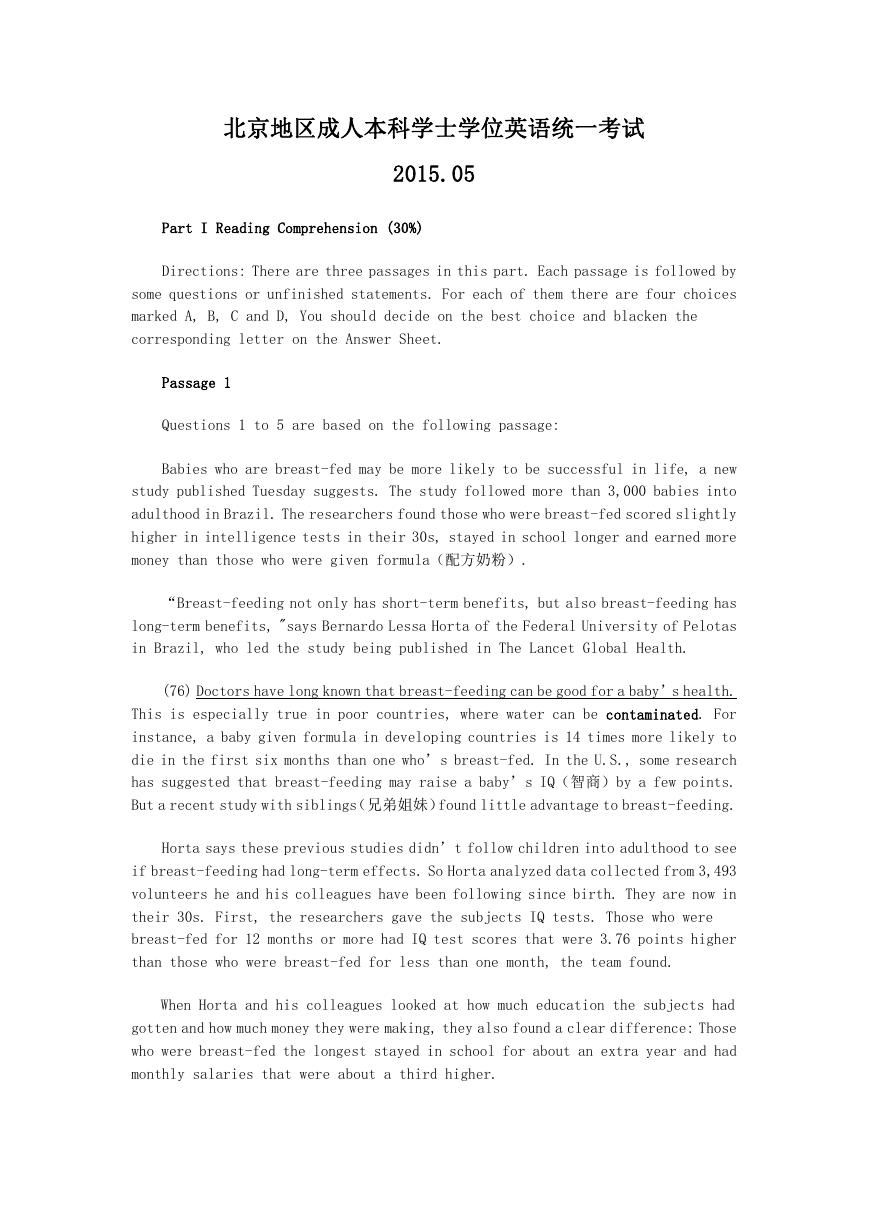

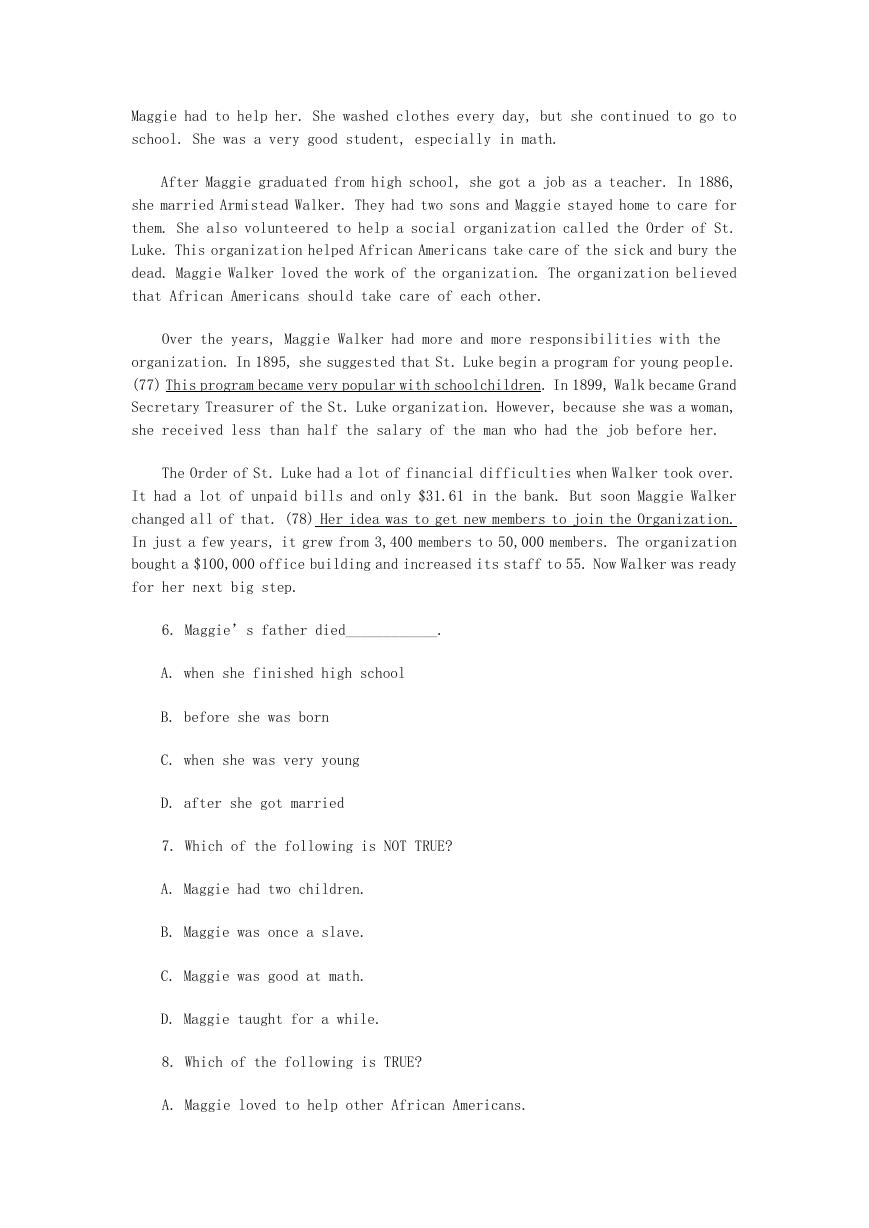

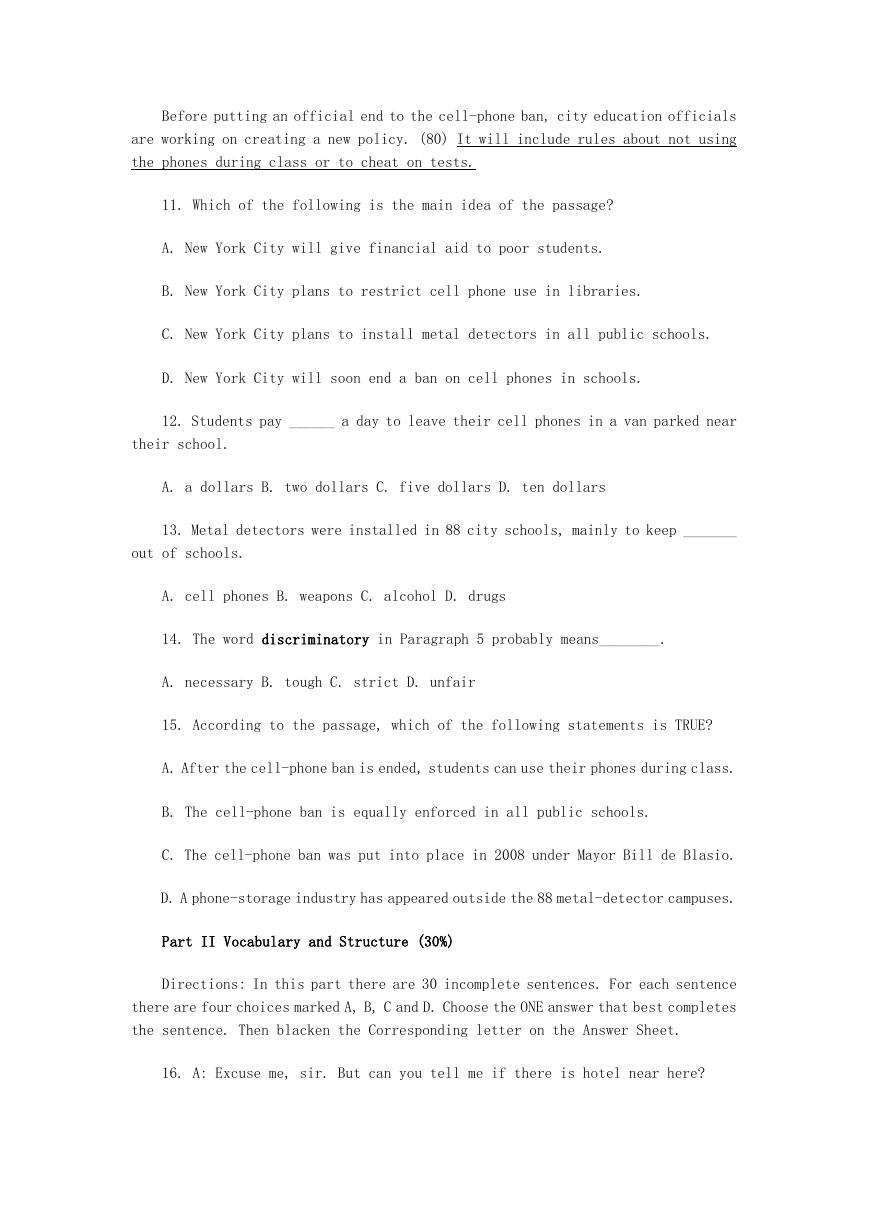
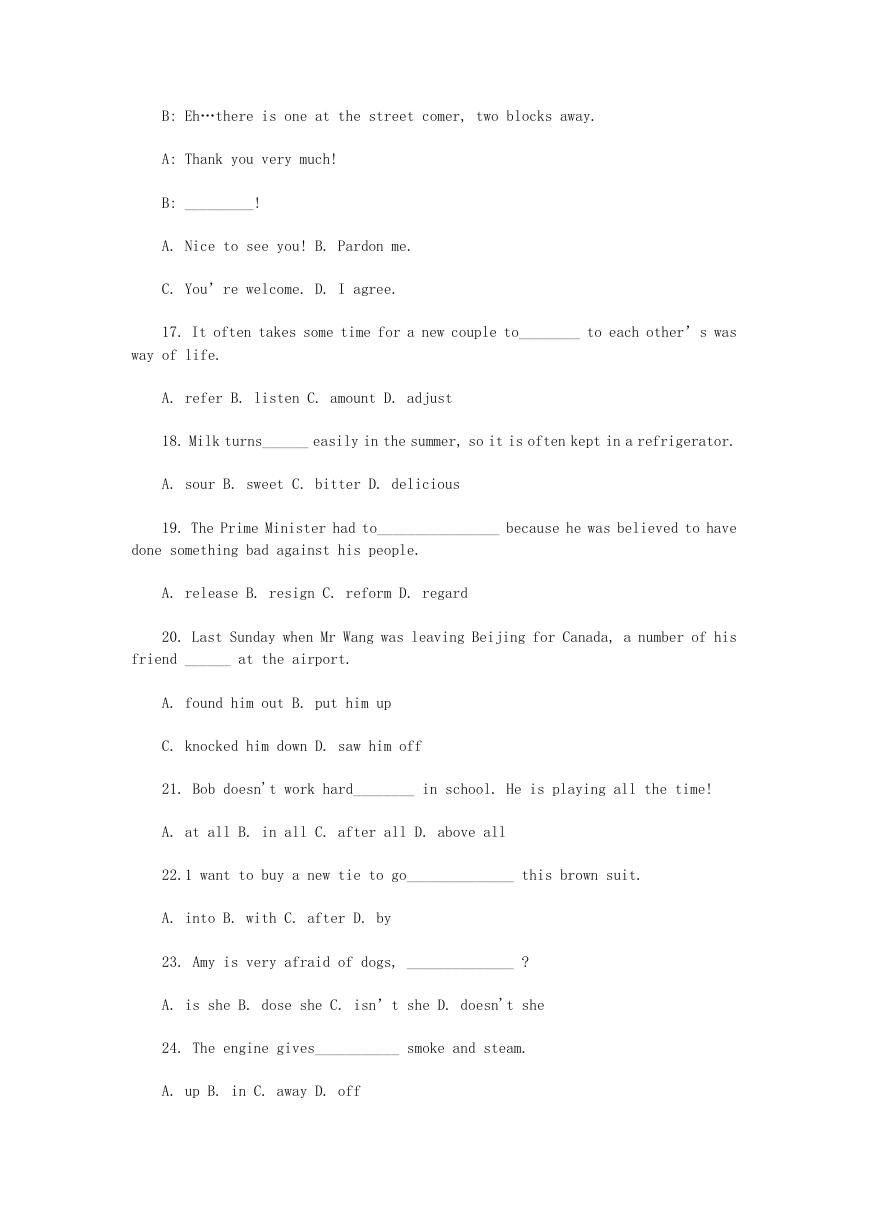
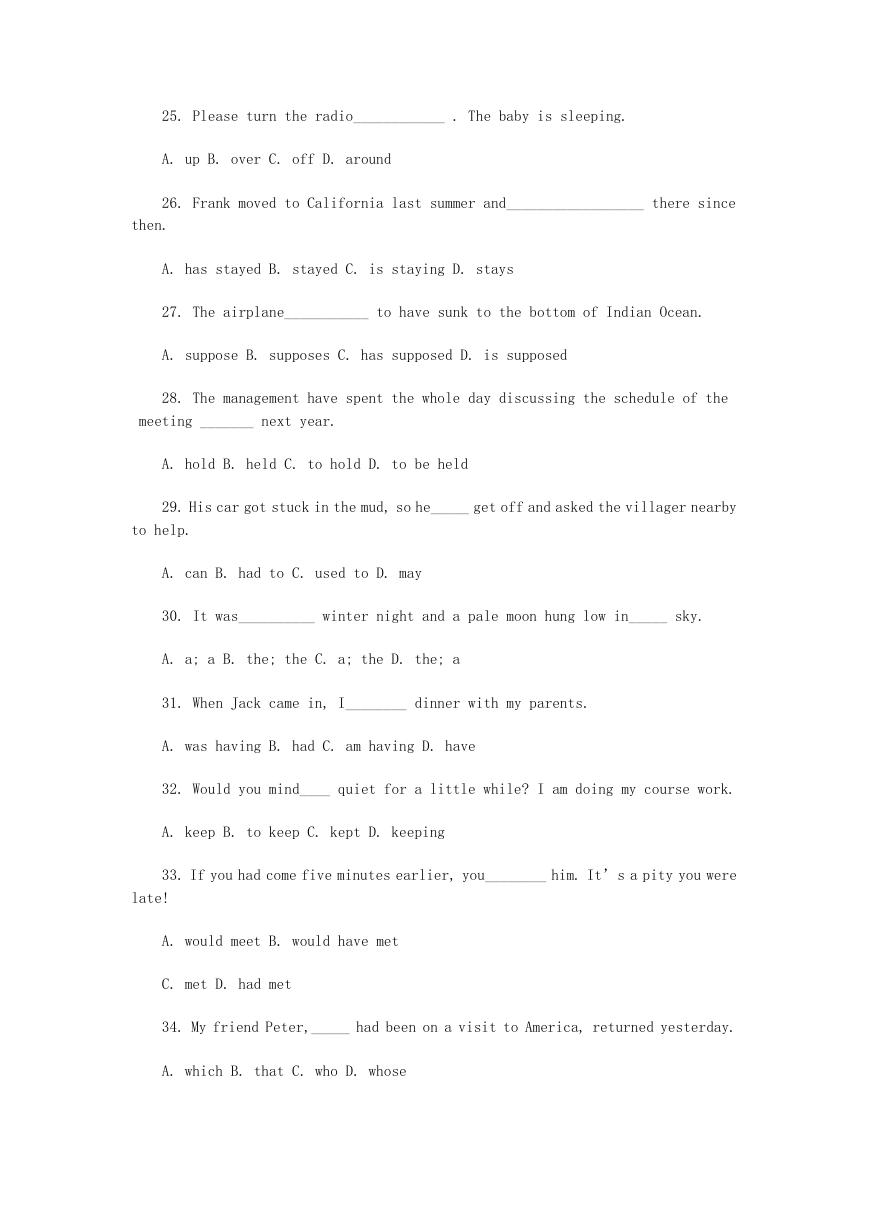
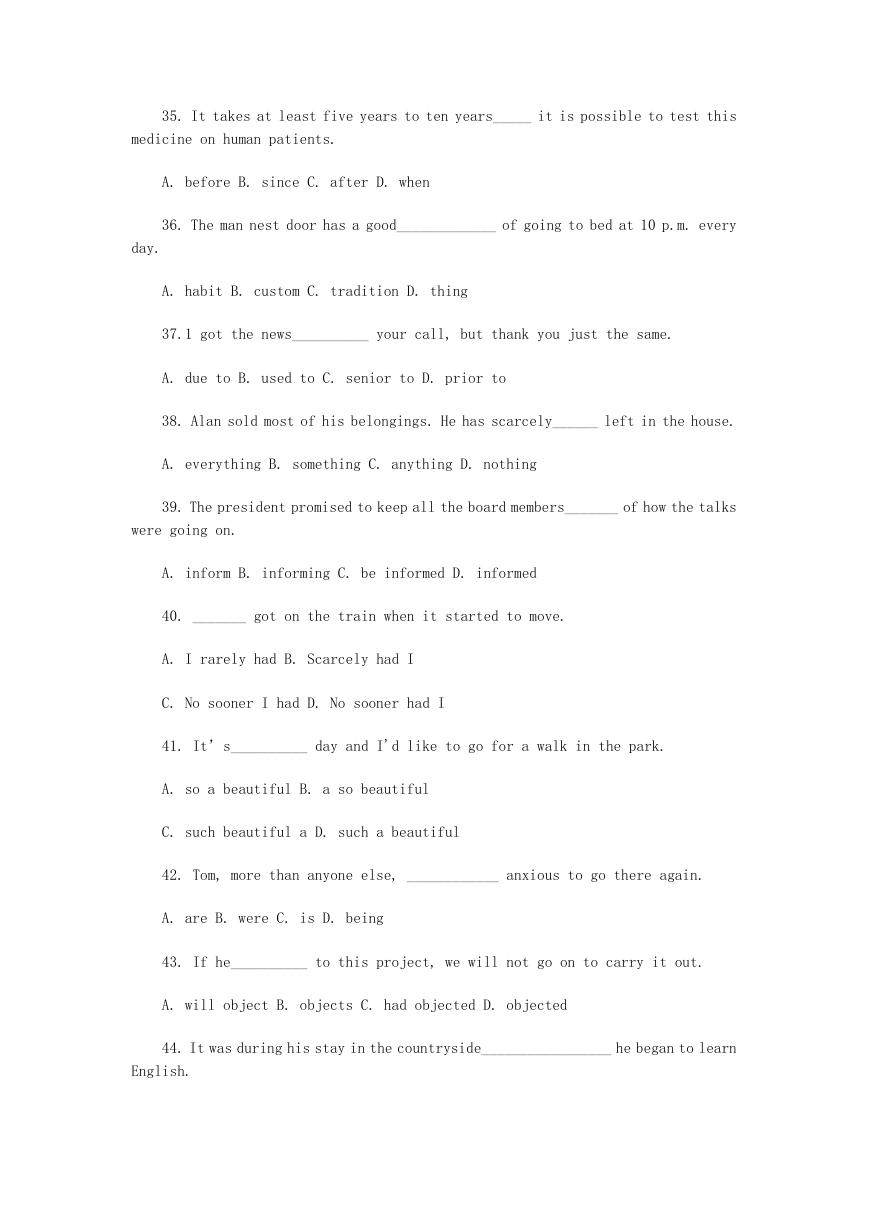








 2023年江西萍乡中考道德与法治真题及答案.doc
2023年江西萍乡中考道德与法治真题及答案.doc 2012年重庆南川中考生物真题及答案.doc
2012年重庆南川中考生物真题及答案.doc 2013年江西师范大学地理学综合及文艺理论基础考研真题.doc
2013年江西师范大学地理学综合及文艺理论基础考研真题.doc 2020年四川甘孜小升初语文真题及答案I卷.doc
2020年四川甘孜小升初语文真题及答案I卷.doc 2020年注册岩土工程师专业基础考试真题及答案.doc
2020年注册岩土工程师专业基础考试真题及答案.doc 2023-2024学年福建省厦门市九年级上学期数学月考试题及答案.doc
2023-2024学年福建省厦门市九年级上学期数学月考试题及答案.doc 2021-2022学年辽宁省沈阳市大东区九年级上学期语文期末试题及答案.doc
2021-2022学年辽宁省沈阳市大东区九年级上学期语文期末试题及答案.doc 2022-2023学年北京东城区初三第一学期物理期末试卷及答案.doc
2022-2023学年北京东城区初三第一学期物理期末试卷及答案.doc 2018上半年江西教师资格初中地理学科知识与教学能力真题及答案.doc
2018上半年江西教师资格初中地理学科知识与教学能力真题及答案.doc 2012年河北国家公务员申论考试真题及答案-省级.doc
2012年河北国家公务员申论考试真题及答案-省级.doc 2020-2021学年江苏省扬州市江都区邵樊片九年级上学期数学第一次质量检测试题及答案.doc
2020-2021学年江苏省扬州市江都区邵樊片九年级上学期数学第一次质量检测试题及答案.doc 2022下半年黑龙江教师资格证中学综合素质真题及答案.doc
2022下半年黑龙江教师资格证中学综合素质真题及答案.doc